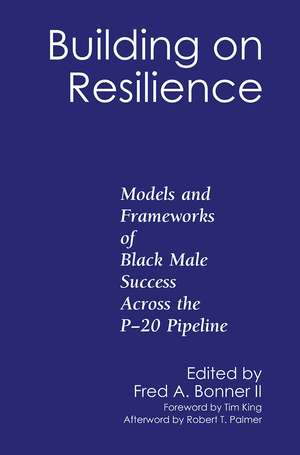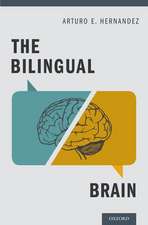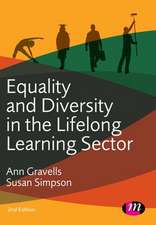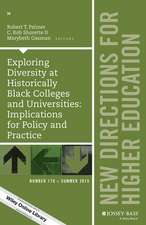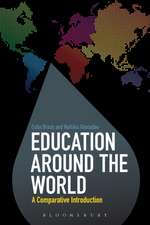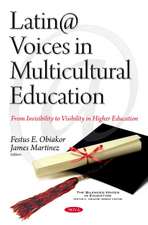Building on Resilience: Models and Frameworks of Black Male Success Across the P-20 Pipeline
Editat de Fred A. Bonner IIen Limba Engleză Hardback – 5 iun 2014
| Toate formatele și edițiile | Preț | Express |
|---|---|---|
| Paperback (1) | 281.63 lei 6-8 săpt. | |
| Taylor & Francis – 23 mai 2014 | 281.63 lei 6-8 săpt. | |
| Hardback (1) | 999.79 lei 6-8 săpt. | |
| Taylor & Francis – 5 iun 2014 | 999.79 lei 6-8 săpt. |
Preț: 999.79 lei
Preț vechi: 1219.25 lei
-18% Nou
Puncte Express: 1500
Preț estimativ în valută:
191.34€ • 199.02$ • 157.96£
191.34€ • 199.02$ • 157.96£
Carte tipărită la comandă
Livrare economică 15-29 aprilie
Preluare comenzi: 021 569.72.76
Specificații
ISBN-13: 9781579229610
ISBN-10: 1579229611
Pagini: 252
Dimensiuni: 152 x 229 x 23 mm
Greutate: 0.44 kg
Ediția:1
Editura: Taylor & Francis
Colecția Routledge
Locul publicării:Oxford, United Kingdom
ISBN-10: 1579229611
Pagini: 252
Dimensiuni: 152 x 229 x 23 mm
Greutate: 0.44 kg
Ediția:1
Editura: Taylor & Francis
Colecția Routledge
Locul publicării:Oxford, United Kingdom
Public țintă
PostgraduateCuprins
Foreword by Tim King, Founder & CEO, Urban Prep Academies Open Letter (About Black Males…)—Pastor Otis Moss III, Trinity United Church of Christ, Chicago, Illinois Acknowledgements Introduction - Strengthening the Pipeline. A Need for Frameworks and Models in Black Male Research—Fred A. Bonner II PART ONE. P-12 FRAMEWORKS AND MODELS 1. A Framework for Black Males in P-12 Urban School Districts—Sharon Michael-Chadwell 2. A Framework for Thinking and Talking About Race With Teachers—H. Richard Milner IV, Quaylan Allen, and Ebony O. McGee 3. Parent Advocacy for Black Males in Gifted and Advanced Programs—Tarek C. Grantham, Christopher O. Johnson, Angie C. Roberts-Dixon, and Eric M. Bridges 4. Missing in Action. African American Males in Gifted Education—Donna Y. Ford, L. Trenton Marsh, Jerell Blakely, and Stanford O. Amos 5. An Examination of the Lived Experience of a Gifted Black Child in Rural Poverty—Thomas P. Hébert 6. The Scholar Identity Model. Black Male Success in the K–12 Context—Gilman Whiting PART TWO. POSTSECONDARY FRAMEWORKS AND MODELS 7. Academically Gifted African American Males. Modeling Achievement in the Historically Black Colleges and Universities and Predominantly White Institutions Context--Fred A. Bonner II 8. Gifted, Black, Male, and Poor in STEM. Achieving Despite the Odds—Alonzo M. Flowers 9. Theorizing Manhood. Black Male Identity Constructions in the Education Pipeline—T. Elon Dancy II 10. Exploratory Study of the Factors Affecting the Academic and Career Development of African American Males in Science, Technology, Engineering, and Mathematics—James L. Moore III, Lamont A. Flowers, and Lawrence O. Flowers 11. The Five Domains. A Conceptual Model of Black Male Success in the Community College—J. Luke Wood and Frank Harris III 12. I Can Do More than Play Ball. Black Male Scholar Athletes—Derrick L. Gragg 13. I Ain’t No Punk. A Framework for Black Gay Male Students’ Belonging—Terrell L. Strayhorn Afterword by Robert T. Palmer, Assistant Professor of Student Affairs, Department of Student Affairs Administration, State University of New York at Binghamton University Contributors Index
Notă biografică
Fred A. Bonner II is professor and endowed chair of educational leadership and counseling in the Whitlowe R. Green College of Education at Prairie View A&M University. He also serves as the founding executive director and chief scientist of the Minority Achievement Creativity and High Ability (MACH-III) Center. His research foci illuminate the experiences of academically gifted African American males across the P–20 pipeline, diverse faculty in academe, and diverse populations in science, technology, engineering, and math (STEM). He is coeditor of two books with Stylus Publishing, Building on Resilience: Models and Frameworks of Black Male Success Across the P–20 Pipeline (2014) and Diverse Millennials Students in College: Implications for Faculty and Student Affairs (2011). Bonner is currently developing a theoretical framework, mascusectionality, that will explore the engagements of Black men. Tim King
Recenzii
“Collectively, the chapters in the book serve as a much needed and important resource on how to advance the success of Black males in education. Indeed, this book is a must read, and more work of this nature is needed to have a meaningful impact on Black males as they matriculate through various educational contexts.”
Robert T. Palmer, Department of Student Affairs Administration
State University of New York at Binghamton University
“Like our school leaders and teachers, the researchers whose work is presented here have chosen to focus their energies not on an autopsy of a failed system, but rather on a close examination—and celebration—of what works for African-American boys. The promising research and practical examples of strategies proven to drive success for African-American boys should help re-frame our conversations about failure and achievement for years to come. This vein of research will provide critical advancement of our ability to design effective interventions that will lead even greater numbers of African-American boys to academic success.”
Tim King, Founder & CEO
Urban Prep Academies
Robert T. Palmer, Department of Student Affairs Administration
State University of New York at Binghamton University
“Like our school leaders and teachers, the researchers whose work is presented here have chosen to focus their energies not on an autopsy of a failed system, but rather on a close examination—and celebration—of what works for African-American boys. The promising research and practical examples of strategies proven to drive success for African-American boys should help re-frame our conversations about failure and achievement for years to come. This vein of research will provide critical advancement of our ability to design effective interventions that will lead even greater numbers of African-American boys to academic success.”
Tim King, Founder & CEO
Urban Prep Academies
Descriere
This book uniquely examines the trajectory of Black males through the educational pipeline from pre-school through college. In doing so it not only contributes significantly to the scholarship on the experiences of this population, but bridges the gap between theory and practice to provide frameworks and models.
